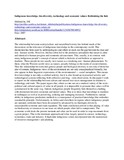| dc.description.abstract | The
relationship between society/culture and nature/biodiversity lies behind much of the
discussions on the relevance of indigenous knowledge in the contemporary world. This
distinction has been used by anthropologists and others to mark out the gap between hu
man
and non
-
human worlds. However, this has often led to the predatory perception that nature is
alien and inimical to human progress and economic advancement. This, usually, is in contrast
with many indigenous people’s concept of nature which is dialectic
al and holistic as opposed to
dualistic. These people do not usually view nature as a totalizing non
-
human phenomenon. To
them, what the Western world views as nature, actually belongs to the realm of social relations.
Thus the relationship between indi
genous people and biological diversity is not only of form
but also of content. Indigenous views of the environment are not only conceptualized formally,
but also appear in their linguistic expressions of the environmental
---
social metaphors. This
means th
at knowledge is not only a cerebral activity, but it is also bound up in practical activity
and technological systems reflecting both collective and long
-
term observation.
In this paper I wish to report on the relationship between culture and natural reso
urces
management in relation to technology and trade. The paper argues that, where as one can see a
marked variety of the socio
-
political and cultural aspects of value in all people, it is impossible
to presume that values will be systematized in the same
way. Indeed, indigenous people
frequently find themselves clashing with distinction between economic and moral values. This
is to show that knowledge is manifest in techniques as well as in perceiving, utilizing and
managing resources. Furthermore, sustain
ability in indigenous production methods is a
consequence of practical knowledge that embodies sustainable principle. Unfortunately, in
Africa and elsewhere in regions where indigenous people are operand, territories have been
devastated by advanced by tec
hnologies driven by unsustainable economic and trade
equations.
The main conclusion arrived is that placing of value on biodiversity or resources is one issue on
which people often fail to compromise. The economic world deals the present moment and
what
can be used in order to reap maximum from a given project. This is the dominant
approach and it has largely spread in science, technology, economics, trade and industry. It
high time indigenous values incorporated into the mainstream of resources managemen
t and
planning. | en |

